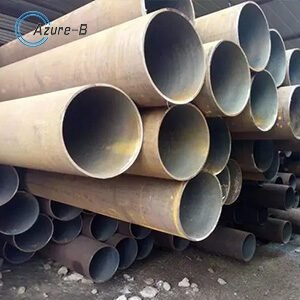ASTM A335 Alloy Steel Seamless Pipe
Alloy Steel Seamless Pipe that covers “chrome-moly” seamless pipes with remarkable resistance to corrosion and good tensile strength at high-temperature service. Generally, ASTM A335 P11, P22, and P91 pipes are used in power generation and downstream oil and gas, P5 and P9 grades are for refinery applications.
Description
ASTM A335 Alloy Steel Seamless Pipe

Standard: ASTM A335
grade:P1,P2,P5,P9,P11,P91,P92
OD:10.3-660mm
WT:1.6-60mm
Length:5.8m-12m or random legth
Alloy Steel Seamless Pipe ASTM A335/ASME SA335 Gr. P5, P9, P11, P22, P91
Standard: ASTM A335
OD:10.3-660mm
WT:1.6-60mm
Length:5.8m-12m or random legth
Technical: Quenching & Tempering
Application: Gas fire power plant, coal fire power plant, headers and steam lines, Feed water pipes, superheaters, and reheaters.
Alloy Steel Seamless Pipe that covers “chrome-moly” seamless pipes with remarkable resistance to corrosion and good tensile strength at high-temperature service. Generally, ASTM A335 P11, P22, and P91 pipes are used in power generation and downstream oil and gas, P5 and P9 grades are for refinery applications.Alloying elements
The addition of Molybdenum (“Moly”) increases the strength of the steel and its elastic limit, enhances the steel resistance to wear, its impact qualities, and the hardenability. It also improves the resistance to softening, makes chromium steel less prone to embrittlement, and prevents pitting.
Chromium, a key element also for stainless steel alloys, prevents steel oxidation at elevated temperatures and increases the resistance of steel to corrosion. It enhances the tensile, yield, and hardness properties of low-alloy pipes at room temperatures.
Other alloying elements, present in various degrees in pipes of all grades are:
1. Aluminum: decreases oxygen from steelmaking
2. Boron: used to produce fine grain size and enhance steel hardness
3. Cobalt: used to enhance the steel’s heat and wear-resistance
4. Manganese: gives better steel hardenability
5. Nickel: Enhances toughness, hardenability, and impact strength at low temperatures
6. Silicon: decreases oxygen, enhances hardenability and toughness
7. Titanium: prevents precipitation of chromium carbide
8. Tungsten: refines steel grain size and enhance the steel hardness, especially at high temperatures
9. Vanadium: gives steel enhanced fatigue resistance
As mentioned, low-alloy steels have a total amount of alloying elements below 5%; high alloy steel has a higher percentage of these elements.
Leave us a message
Related Products
Related Products
- tag -->
- NoDisplayProduct
High-Quality SS400 Steel Pipe: Durable & Versatile for Various Applications
Rated 0 out of 5Read more - NoDisplayProduct
High-Quality Steel Pipe Fittings: Durable and Versatile Solutions for Various Applications
Rated 0 out of 5Read more - NoDisplayProduct
Premium Stainless Steel Pipe Fittings: Durable & Versatile Solutions
Rated 0 out of 5Read more - NoDisplayProduct
Premium Stainless Tube: Durable & Versatile Tubing Solutions for Various Applications
Rated 0 out of 5Read more - NoDisplayProduct
Achieve Superior Quality with ASTM A106: The Ultimate Guide and Benefits
Rated 0 out of 5Read more - NoDisplayProduct
High-Quality Carbon Steel Pipe: Durable & Versatile Piping Solution
Rated 0 out of 5Read more - NoDisplayProduct
High-Quality SST Tubing: Durable and Versatile Stainless Steel Tubes
Rated 0 out of 5Read more - NoDisplayProduct
High-Quality Stainless Steel Pipes: Durable and Versatile Solutions for Various Applications
Rated 0 out of 5Read more - NoDisplayProduct
High-Quality Galvanized Steel Pipe: Durable & Corrosion-Resistant Solutions
Rated 0 out of 5Read more - NoDisplayProduct
High-Quality Stainless Steel Tubes: Durable, Versatile, and Affordable
Rated 0 out of 5Read more



